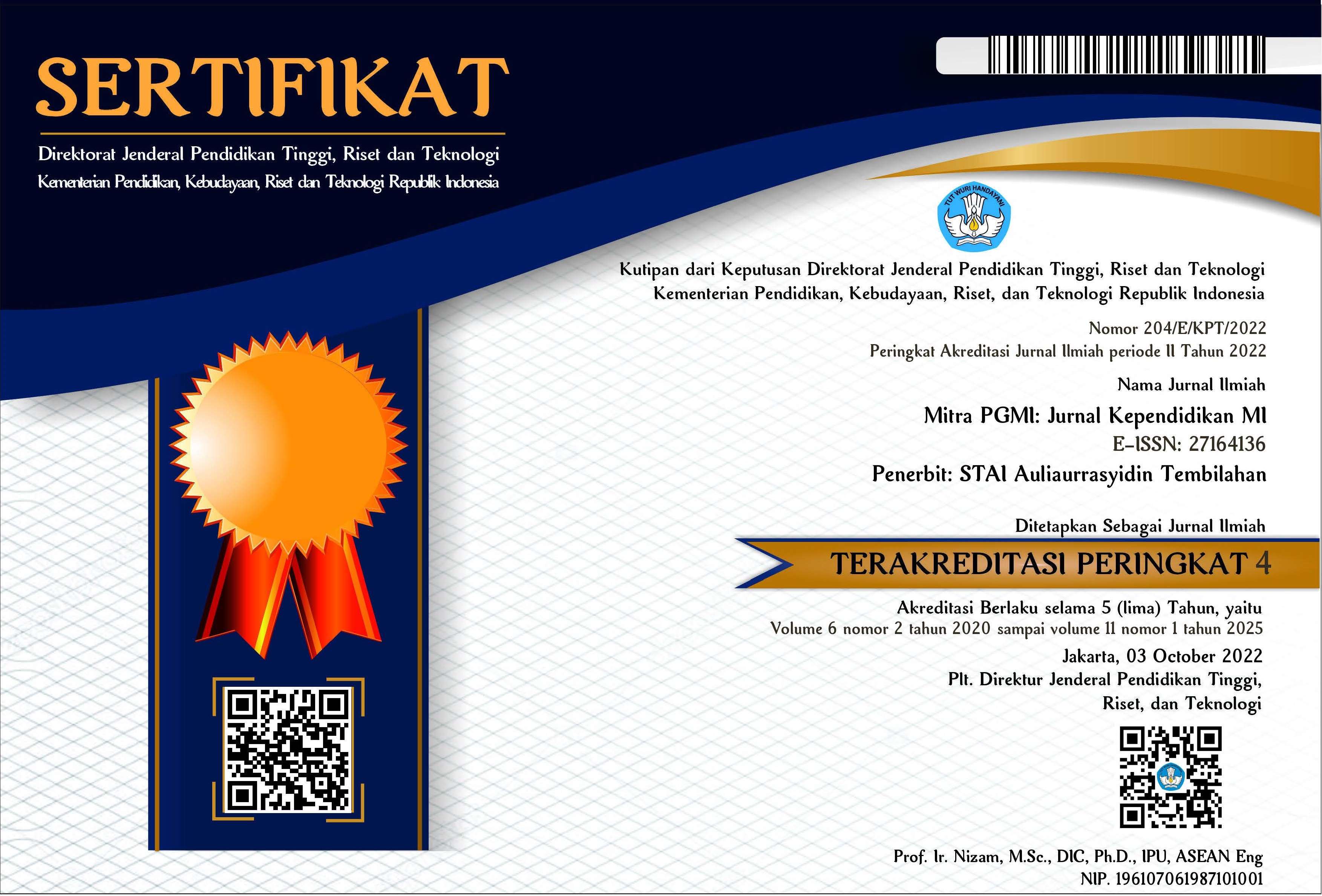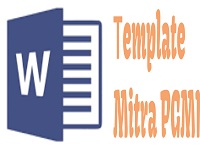Manfaat Pembelajaran Tematik Terintegrasi Ilmu Keislaman bagi Perkembangan Psikologis Peserta Didik
DOI:
https://doi.org/10.46963/mpgmi.v9i2.1159Keywords:
Thematic Learning, Islamic Sciences, Psychological, StudentsAbstract
This article aims to explain the benefits of integrated thematic learning in Islamic sciences in the context of the psychological development of students. The research method used is descriptive, which involves a literature review of related studies and secondary data analysis. The results of the analysis show that integrated thematic learning of Islamic sciences has significant benefits for the psychological development of students. Among other things, it can increase understanding and awareness of moral and ethical values in the Islamic religion, strengthen students' Islamic identity, help improve students' social and emotional skills, and also provide relevant and meaningful contexts for student learning. In conclusion, by strengthening religious values, Islamic identity, social skills, and the relevance of learning, this approach can provide a holistic educational experience and prepare students to become individuals with integrity and psychological development.
Downloads
References
Abdul Haris Suharsono. (2019). Perkembangan Peserta Didik: Teori dan Praktik. Yogyakarta: Pustaka Pelajar.
Anwar, H., Afandi, R., & Nurdin, N. (2022). Pengaruh pembelajaran tematik terintegrasi ilmu keislaman terhadap pemahaman keterkaitan antara ilmu pengetahuan dan agama peserta didik. Jurnal Pendidikan Dasar, 24(1), 55–66.
Asnawi, A., & Lubis, A. A. (2016). Model pembelajaran tematik integratif sebagai upaya meningkatkan kompetensi keagamaan peserta didik. Jurnal Pendidikan Agama Islam, 12(2), 103–116.
Fitriani, S., & Setyawan, A. (2022). Pengaruh pembelajaran tematik terintegrasi ilmu keislaman terhadap perkembangan nilai moral peserta didik. Jurnal Pendidikan Guru Madrasah Ibtidaiyah, 7(1), 67–80.
Hadi, S., Suyatno, & Wardani, I. (2018). Pengembangan model pembelajaran tematik terintegrasi sebagai upaya meningkatkan kecerdasan emosional peserta didik. Edukatif: Jurnal Ilmu Pendidikan, 2(2), 152–165.
Hamdan, A. R., & Said, M. N. H. M. (2015). Pembelajaran tematik integratif untuk perkembangan peserta didik. Jurnal Pendidikan Islam, 4(2), 171–184.
Kurniawan, Y., & Mardiyana, M. (2020). Pengaruh pembelajaran tematik terintegrasi ilmu keislaman terhadap motivasi intrinsik peserta didik. Jurnal Edukasi, 7(1), 1–14.
Mutakin, M., & Hamidah, H. (2019). Pengaruh pembelajaran tematik terintegrasi ilmu keislaman terhadap kreativitas peserta didik. Jurnal Penelitian Pendidikan Islam, 7(2), 193–210.
Rahmat, A., & Wahyuni, A. (2018). Pengaruh pembelajaran tematik terintegrasi ilmu keislaman terhadap keterampilan berpikir kritis peserta didik. Jurnal Pendidikan Dasar, 19(1), 23–34.
Setyowati, R., & Siswanto, A. (2021). Pengaruh pembelajaran tematik terintegrasi ilmu keislaman terhadap penurunan stres dan kecemasan peserta didik. Jurnal Ilmiah Pendidikan Dasar, 5(2), 98–108.
Suciati, N., & Sari, P. (2021). Pengaruh pembelajaran tematik terintegrasi ilmu keislaman terhadap hubungan peserta didik dengan orang tua dan komunitas agama. Jurnal Pendidikan Guru Madrasah Ibtidaiyah, 6(1), 119–134.
Sugiyono, S., & Kurniawan, Y. (2019). Pembelajaran tematik terintegrasi ilmu keislaman untuk meningkatkan keterampilan berpikir kritis peserta didik. Jurnal Inovasi Pendidikan IPA, 5(2), 191–202.
Suwarno. (2020). Integrasi Pendidikan Islam dalam Pembelajaran Tematik. Jakarta: Prenada Media Group.
Wahyuni, A., & Haryani, E. (2022). Pengaruh pembelajaran tematik terintegrasi ilmu keislaman terhadap peningkatan kepercayaan diri peserta didik. Jurnal Pendidikan Dasar, 23(1), 76–88.
Widyastuti, I., & Hidayat, A. (2017). Pengaruh pembelajaran tematik integratif terhadap perkembangan emosional peserta didik di Sekolah Dasar Islam Terpadu (SDIT) Anak Sholeh Surakarta. Jurnal Didaktika Dwija Indria, 4(2), 89–100.
Zaini, A., Aini, F., & Mubarok, H. (2020). Pengaruh pembelajaran tematik terintegrasi ilmu keislaman terhadap rasa memiliki peserta didik. Jurnal Pendidikan Guru Madrasah Ibtidaiyah, 5(2), 187–200.
Downloads
Published
Issue
Section
License
Copyright (c) 2023 Syaifudin Syaifudin, Roso Murti

This work is licensed under a Creative Commons Attribution-ShareAlike 4.0 International License.
Authors who publish with this journal agree to the following terms:
1. Copyright on any article is retained by the author(s).
2. The author grants the journal, right of first publication with the work simultaneously licensed under a Creative Commons Attribution shareAlike 4.0 International License that allows others to share the work with an acknowledgment of the work’s authorship and initial publication in this journal.
3. Authors are able to enter into separate, additional contractual arrangements for the non-exclusive distribution of the journal’s published version of the work (e.g., post it to an institutional repository or publish it in a book), with an acknowledgment of its initial publication in this journal.
4. Authors are permitted and encouraged to post their work online (e.g., in institutional repositories or on their website) prior to and during the submission process, as it can lead to productive exchanges, as well as earlier and greater citation of published work.
5. The article and any associated published material is distributed under the Creative Commons Attribution-ShareAlike 4.0 International License








2.png)


